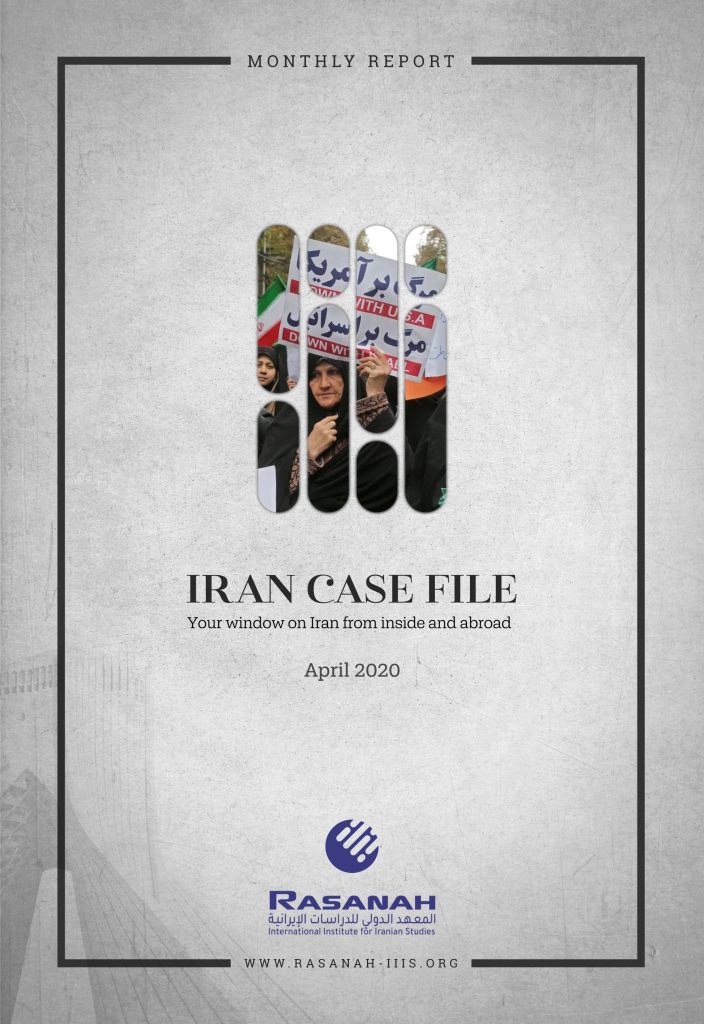
The International Institute for Iranian Studies (Rasanah) has issued its monthly Iran Case File for April 2020. This file reviews the latest developments in the Iranian arena, providing readers interested in Iranian affairs with comprehensive insights and in-depth analysis on Iran during this month. The file is divided into three main parts: Internal Affairs, Arab Affairs and International Affairs.
At the ideological level within Iran, owing to the influence exercised by clerics within the Iranian political system, there was growing pressure on the government to accelerate the reopening of religious shrines even though there is a high probability of coronavirus infections increasing as a result of this decision. The Rouhani government wanted to inform the public of the dangerous situation when it released a map showing the regions where the virus is spreading Iran. The map shows that the cities of Mashhad and Qom are among the red zone cities.
At the political level, the file discusses the reactions to the report of the Financial Industry Regulatory Authority which accused the government of embezzling public funds. These allegations of corruption relate to Iran’s volatile exchange rate and the fact that there are multiple prices for the dollar against the local currency. The Rouhani government commented on the report’s accusations saying that the financial regulatory body focuses only on the government while ignoring the regime’s apparatuses not controlled by the government, allowing them to do whatever they want. This reflects that the Iranian state suffers from a crisis in values more than mismanagement.
On the economic level, the Iranian government presented a financial package to help the Iranian people. For the first time, the Iranian supreme leader approved wealth to be released from the National Development Fund to ease the country’s economic burdens and address the budget deficit. Perhaps the supreme leader’s decision is part of Iran’s quest to obtain a loan from the International Monetary Fund (IMF) which is opposed by the United States. Iran obtaining a loan would weaken the US maximum pressure strategy against Tehran.
On the military level, the file discusses the implications of Iran’s launch of its first military satellite, which uses a domestically made missile. It also sheds light on the US objections as the launch of the satellite constitutes a breach of UN Security Council Resolution 2231— which bans Iran from conducting tests on ballistic missiles which have the potential to carry nuclear warheads.
On the regional level, in particular Iran’s relations with its Arab neighbors, Tehran is facing the likelihood of having its role diminished in Syria due to the growing role of Russia and the possibility of removing Bashar al-Assad from power. The latter is due to Russia changing its position on al-Assad remaining in power. Russia wants to create a political situation in Syria which allows for the crisis to come to an end.
As for Iraqi affairs, Iran agreed to Mostafa al-Kazemi becoming the prime minster in Iraq despite the fact he is not part of the Iranian camp like the others. But he is not hostile to Tehran and could be a good mediator between Iran and the United States. He is also able to avoid opening the file related to the weapons possessed by the pro-Iran militias.
As for Yemeni affairs, Iran still provides the Houthis with weapons and rejects any peaceful initiatives. The Houthis have violated consecutive ceasefires announced by the Arab coalition forces in Yemen by increasing the assaults on fronts near Sana’a.
On the international level, the file discusses how Iran failed in its diplomatic efforts to gain international support to lift the economic sanctions imposed on it by the United States. It has promoted the idea that the US sanctions hinder its efforts to fight coronavirus. Finally, the file reviews the Putin initiative to create a ‘green corridor’ which aims to facilitate trade exchange among countries hit by US sanctions.


